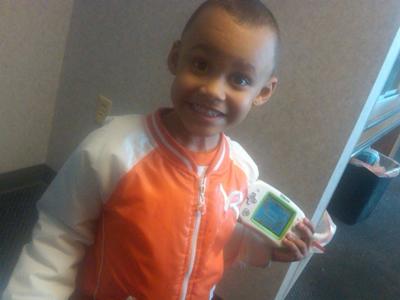What if a child passes out when upset, and the problems started after a traumatic event? Can this be related and maybe a symptom of PTSD? A worried mom to a 4-year-old asks.

Let’s explore why a child may pass out when upset and if there are any connections to PTSD symptoms.
Mom’s Question:

My son is 4 years old; when he gets hurt or angry, he starts to cry, but nothing comes out. His eyes roll in the back of his head, and he starts to have seizures, then passes out.
I have talked to doctors but never had tests done. The seizures started when he was two years old after his father was murdered. It’s been about six times in 2 years. Is this related, like some symptoms of post-traumatic stress syndrome (PTSD)?
What can I do for my son, because I don’t want to be away from him if it continues to happen? Thank you
Kari Winder
Breath-Holding Spells In Children
Can Breath-Holding Spells be Triggered by Trauma and PTSD?
I am so sorry to hear about the traumatic event in your family. Surely it affects both of you a lot, and I hope you have help around you to help you heal.
From what you describe, it sounds as if your son has something called breath-holding spells. They are actually more common than one would think and affect around 0.1-5% of all children who are between six months and five years old. The spells usually start when the child is between 6 months and 18 months old and almost always before they turn two years old. It’s very rare for this to start when they’re newborns.
Both boys and girls can have these episodes, but it’s a little more common in boys. If someone else in the family has had these episodes before, there’s a chance your child might have them too – it happens in about 20 to 35 out of every 100 cases.
Since you mention your son’s father’s tragic death, I assume you see a possible connection between the event and your son’s behavior. Although breath-holding spells are described as a response to trauma, what is meant is a response to something ongoing, overwhelming for the child (such as pain or frustration), not a traumatic event of the past.
Possible causes of breath-holding spells are largely unknown, but iron deficiency is often observed in these children. Research has also found that some temperaments (easily frustrated, more sensitive) in children are more commonly associated with breath-holding spells and that breath-holding spells may be a symptom of a disturbed parent-child relationship.
I have not been able to find any research or articles that support the idea that breath-holding can be a consequence of PTSD and traumas. However, one study did find a connection between anxiety, depression, prenatal stressful events, and poor family functioning in mothers and breath-holding spells in their children. If you feel that this describes your situation, it can be something to bring up with your or your child’s doctor.
Regarding PTSD symptoms in children, Nemours Children’s Health lists the following:
- upsetting thoughts of the trauma
- bad dreams or sleep problems
- bad memories, called flashbacks that make it seem like the trauma is still happening
- avoiding things that remind them of the trauma
- being more easily startled, scared, or anxious
- being more moody, sad, angry, or not enjoying things as before
- not remember some parts of what happened
It is also mentioned that younger children may show more fearful and regressive behaviors (returning to a previous level of development)
They may re-enact the trauma through play.
Again, if you believe that your son may be experiencing symptoms related to trauma, do talk to his healthcare provider. Breath-holding spells are not mentioned as a symptom of PTSD, and since they started when your son was 2 years old, it is likely that their onset just happened to correlate with his father’s death. But again, since anxiety, depression, and prenatal stressful events have been found to be associated with breath-holding spells, there could be some sort of connection – to be discussed with your healthcare provider if you think it is relevant.
What are Breath-Holding Spells?
A breath-holding spell is not a seizure; it is a transient period in which young children stop breathing after crying, generally because of anger or pain. Breath-holding spells often start at around the age of 2 and disappear at around 5 or 6 years old. And most important, despite being very frightening for the people seeing the event, they are not dangerous for the child.
Breath-holding spells are caused as a response of the child’s nervous system to unpleasant events, such as becoming upset or angry. As mentioned, it is also possible that breath-holding spells are caused by iron deficiency or certain genetic conditions.
What To Do to Help Your child?
There are a few things you can do about the situation. First of all, talk again to a pediatrician to make sure what is happening really is breath-holding spells. Sometimes they can be confused with other illnesses, such as epilepsy. They are different, though, and a doctor can tell them apart.
Try to document all symptoms before, during, and after the event to discuss with the doctor. Your doctor will perform some tests such as blood tests (to check iron deficiency), EKG (to check the heart), and EEG (to check for seizures) to rule out other health problems.
Epilepsy is much less common than breath-holding spells, and seizures do not typically occur when a child is upset.
A characteristic sequence of stimulus (such as getting hurt), a cry, pause, facial color change, limp unresponsiveness, and then jerking marks it as a breath-holding spell, not epilepsy.
The best way to distinguish epilepsy from breath-holding is to search for a trigger: epilepsy rarely has one, and breath-holding almost always does – like in your son’s case.
When all that is done, make sure you know enough about this situation to be able to teach other people who may be around when it happens. I understand that you don’t want to be away from your son when it happens. But that isn’t always possible, for example, if you have to go to work. If you can tell his babysitter, teacher, et cetera, what is going on and how to deal with it, then you don’t have to be so worried.
For example, one might try to calm him down before he gets too frustrated. At 4 years old, you can try distracting him; it may still work. Also, make him feel as safe and secure as possible without limiting his urge to explore the world.
Breath-holding spells do not need treatment unless they are produced by other medical conditions. When the spells occur, he should simply be put on his side in a safe place. No shaking, no water in his face, nothing in his mouth, as some people believe. You can put a cold towel on the forehead of your son to help shorten the episode. Just keep him safe and keep calm. Also, don’t make much fuss about it afterward.
Remember that if it really is a breath-holding spell, it is an involuntary reflex that isn’t dangerous and that he will grow out of. However, you should contact your doctor if breath-holding spells occur more often than usual or if your son stops breathing for more than a minute or has trouble breathing.
I hope this helps,
Paula
(Answer approved by our Medical Reference Team)
Read Next About Children Passing Out
- Baby Passing Out When Crying: Breath-Holding Spells Explained
- Baby Passing Out After Crying Due To Mom’s Reaction?
- What Could Cause Baby To Pass Out Of Anger?
- Baby Vomits Then Passes Out
Find answers and comments below.
Research References
- Leung AKC, Leung AAM, Wong AHC, Hon KL. Breath-Holding Spells in Pediatrics: A Narrative Review of the Current Evidence. Curr Pediatr Rev. 2019;15(1):22-29. doi: 10.2174/1573396314666181113094047. PMID: 30421679; PMCID: PMC6696822.
- Nemours Kids Health: Posttraumatic Stress Disorder (PTSD) in Children
- Eliacik K, Bolat N, Kanik A, Sargin E, Selkie E, Korkmaz N, Baydan F, Akar E, Sarioglu B. Parental attitude, depression, anxiety in mothers, family functioning and breath-holding spells: A case control study. J Paediatr Child Health. 2016 May;52(5):561-5. doi: 10.1111/jpc.13094. Epub 2016 Apr 18. PMID: 27089451.

Paula Dennholt founded Easy Baby Life in 2006 and has been a passionate parenting and pregnancy writer since then. Her parenting approach and writing are based on studies in cognitive-behavioral models and therapy for children and her experience as a mother and stepmother. Life as a parent has convinced her of how crucial it is to put relationships before rules. She strongly believes in positive parenting and a science-based approach.
Paula cooperates with a team of pediatricians who assist in reviewing and writing articles.







Kari,
I do not see on the page what your husband died from, but if it was from a heart condition I would have every test done to make sure he does not have a heart problem.
Many children are miss diagnosed with seizures when they really have a heart problem.
I lost my son at seventeen to sudden cardiac arrest and I listened to my doctor that he was okay instead of doing more testing and he had an enlarged heart. Electrical problems such as Long QT syndrome can cause seizures and it is miss diagnosed many times as being a seizure. So have your child checked further. If he is fine then you will have peace of mind knowing that you did everything to make sure he is okay.
People including doctors don’t think of children having something wrong with their hearts.
She mentioned her husband was murdered, so it was nothing with a heart condition.